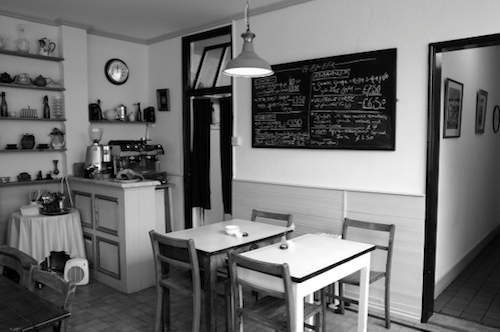 Sitting in a cafe writing – can there be anything better? For me at least, I don’t think so… And so it makes perfect sense to bring together cafes and my exploration of politics – a kind of politics that partly has roots in the coffee houses of the seventeenth and eighteenth centuries.
Sitting in a cafe writing – can there be anything better? For me at least, I don’t think so… And so it makes perfect sense to bring together cafes and my exploration of politics – a kind of politics that partly has roots in the coffee houses of the seventeenth and eighteenth centuries.
The romance and egalitarianism of coffee houses can be exaggerated – it’s said that people from all stratas of society were welcome, that no attention was paid to rank – but that only applied to men, as women were not permitted inside. With all the buzz of innovation, of ideas and debate, the headiness of the cry of ‘What news sir’ as people entered, it came as no real surprise when I was told that, as well as the women who campaigned to keep men out of them, there is a hidden history of subversive women dressing as men in order to be part of it.
Cafes have always been rich places for me – from my younger days dreaming of sitting in a cafe wearing a black polo neck reading a novel, or talking animatedly, looking fascinating. Simone de Beauvoir at the Café de Flore Dorothy Parker at the Alonquin Hotel, Simone Weil, all those women whose intellectual and social life revolved around cafes, circles of friends. (I may be pushing it a bit with Weil, but I like to think of her hunched over a cup of coffee writing in Paris, and later, in London, over a strong cup of tea).
The romance of the cafe is also tied in with the story of the Moleskine notebook, the image of the writer contemplatively sipping an espresso. The history of the cafe, its central role in important social movements, means that cafes still inspire hopes of community, ideas and inspiration, despite having had so much of their substance scraped out and repackaged by the likes of Starbucks and Cafe Nero.
Today, I’m sitting in the Blue Brick cafe in East Dulwich – there’s a couple talking, someone chatting on their phone and a woman reading the paper. Another woman was writing on her blackberry – but is now sipping her tea, thinking and another two women have just arrived, giddy with the novelty of a day off.
As I sip my peppermint tea – today, for some reason, my stomach doesn’t fancy coffee – I feel excited about working in cafes and connecting with that rich seam of history and imagination that still makes cafes feel like places of potential. That’s why I’m going to be writing in cafes – talking about the places I write in, as well as about a different kind of politics that is emerging – a politics that seems both new and old, all about ideas and social justice, about people getting together to dream and imagine how things could be and then work out how to experience the reality.
Leave a Reply
You must be logged in to post a comment.